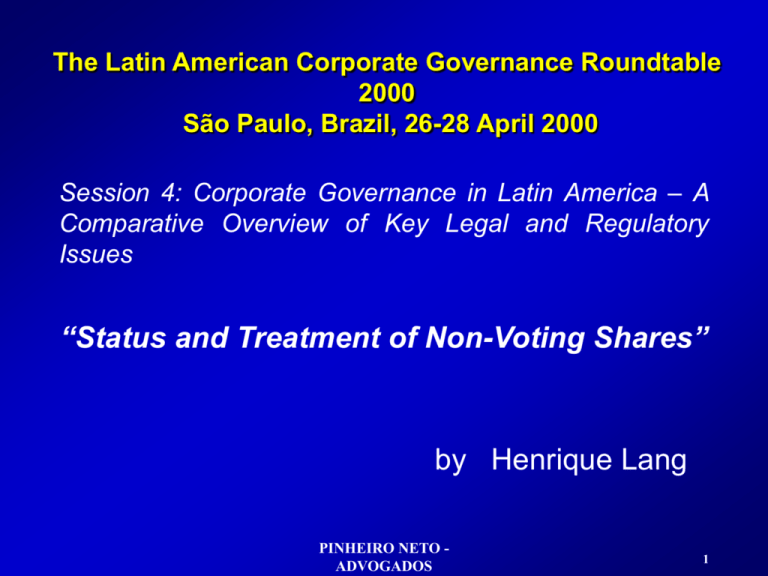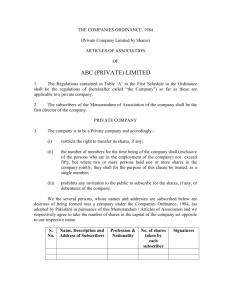Status and Treatment of Non-Voting Shares
advertisement

The Latin American Corporate Governance Roundtable 2000 São Paulo, Brazil, 26-28 April 2000 Session 4: Corporate Governance in Latin America – A Comparative Overview of Key Legal and Regulatory Issues “Status and Treatment of Non-Voting Shares” by Henrique Lang PINHEIRO NETO ADVOGADOS 1 Current Status (Law 6404 of 1976, as amended) A Brazilian corporation may issue up to 2/3 of its capital stock in preferred non-voting shares. A shareholder may retain absolute control by holding shares representing 17% the equity, assuming a company with a ratio 1/3 common voting shares (33%) and 2/3 preferred non-voting shares (67%). The few common shares floated in the open market generally have low liquidity, which makes them unattractive and undervalued. PINHEIRO NETO ADVOGADOS 2 1997 Reform (Law 9457) Law 9457 intended to facilitate the privatization of public utilities (telephone and power companies) by eliminating certain minority shareholder rights, notably: 1. withdrawal rights in corporate restructuring transactions (mergers, consolidations and spinoffs); 2. mandatory tender offers in corporate control changes. As a trade-off for the elimination of minority shareholder rights, preferred shares of companies that do not provide for fixed or minimum dividend payments are entitled to receive dividends that are at least 10% greater than common share dividends. PINHEIRO NETO ADVOGADOS 3 1997 Reform (Law 9457) – Cont’d The 10% premium on dividends may give rise to conflicts of interest between controlling and public shareholders as dividend rights attributed to preferred shares (owned by the public) are incommensurate to their equity stake in the company in detriment to common shares (in the hands of controlling shareholders). A number of companies resolved to create a small minimum dividend for preferred shares (e.g. R$0.01 per share) to meet legal requirements. PINHEIRO NETO ADVOGADOS 4 Certain Revision Proposals Elimination of preferred non-voting shares. The issue of preferred non-voting shares would be limited to 50% of the capital stock (a return to the 50% ratio in force prior to 1976). Transition period: proposals under discussion vary from (a) one year as from effectiveness of the new legislation to (b) the earlier of the third equity issue or five years. Over the past years, initiatives to reduce the ratio of voting/non-voting shares have faced strong opposition of public companies led by ABRASCA. PINHEIRO NETO ADVOGADOS 5 Kapaz Clean Bill (as approved at the Commission for Economic Affairs of the House of Representatives) Ratio of voting/non-voting shares is limited to 50% of the capital stock. Eliminates the 10% premium on dividends. Alternatives offered for preferred shares: 1. Priority payment of dividends at 3% of the book value per share. or 2. A dividend equal to common share dividends plus the right to sell preferred shares at the same price and conditions in case of a change in control (tag along right). PINHEIRO NETO ADVOGADOS 6 Kapaz Clean Bill – Cont’d Election of one member of the Board of Directors by the holders of preferred shares (representing at least 10% of the capital stock) and one member of the Fiscal Board at a separate cast (the vote of controlling shareholder being excluded). Transition Rules: The new ratio would apply immediately to newlyorganized companies and private companies going public. Existing public companies may maintain their current ratios, but trading of newly-issued shares on Stock Exchanges will only be permitted at the new ratio. PINHEIRO NETO ADVOGADOS 7 Personal Thoughts Although the Kapaz Clean Bill has clear merits, the 50% ratio of voting to non-voting shares is still a modest change for international standards. A shareholder will be able to retain absolute control by holding shares representing 26% of the equity, assuming a company with a ratio of 50% of common voting shares and 50% of preferred non-voting shares. Instead of reducing the ratio of voting to non-voting shares or eliminating preferred shares, the law should only limit or prohibit the primary distribution of preferred non-voting shares by public companies. PINHEIRO NETO ADVOGADOS 8 Personal Thoughts – Cont’d Companies wishing to access the capital markets for funding purposes would be required to issue voting shares. Current distortions would be cured in the long run without affecting rights of incumbent controlling shareholders. An exception should be made for the primary distribution of preferred shares with fixed dividends, since these shares may be considered as mezzanine instrument (quasi debt). Preferred non-voting shares are valid instruments for structuring business transactions that involve private companies (e.g., joint ventures). hrq:ivn 2542000 \16\136859\trn\cg_roundtable PINHEIRO NETO ADVOGADOS 9







